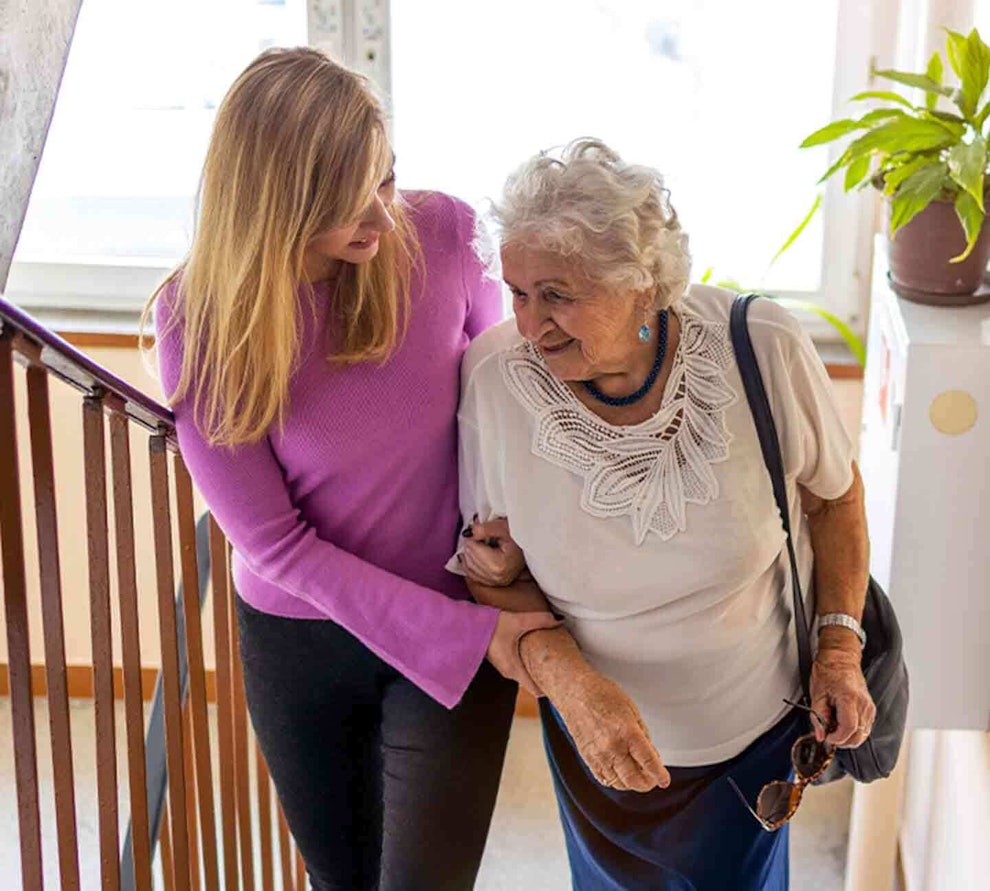Article at a glance
The first step in becoming a caretaker for a family member is understanding when it’s appropriate to step in and assist your parents with their healthcare and wellbeing.
There are many different components and responsibilities associated with a caregiving position.
Adult children caring for their parents need to keep their own health and wellbeing in mind when working as a caretaker to avoid experiencing ‘caregiver burnout’ or developing a serious mental health issue.

Becoming your parent’s caretaker can be difficult to adapt to as it highlights a change in your parent’s life as well as a new chapter in your relationship. Furthermore, being a caregiver is a large responsibility as it requires a lot of work, sacrifice, and time. Learning when to step in and setting expectations for what your parent needs, along with what you can handle, is crucial.
The tips outlined in this piece aim to make the transition for adult children caregivers smoother, guiding you into this new role as a care provider.
Knowing When to Step In As Adult Children
There are a variety of reasons family members step in as caregivers; a parent’s gradual health decline, a sudden health emergency or new health issues, a new diagnosis or treatment plan, etc. The realization that it’s time for adult children to step in and get their parents help, may hit each family at different stages for different reasons. That being said, it’s important to be involved in your parent’s day-to-day routine as they get older so you can notice changes in their behaviors or habits if the change is gradual. Recognizing a shift in your parent’s patterns could help you realize when it’s time to step in or coordinate extra care for them. A pattern change could look like elderly parents skipping dates with friends, missing a bill payment, looking over a doctor’s appointment, etc. The more you’re involved, the more you can recognize when your parent may be losing touch and need someone to step in.
Guidance for Family Caregivers and Other Family Members
Before fully stepping into this new position as a family caregiver, it’s important to set boundaries, do your research, and understand the weight of what you’re agreeing to.
Setting Expectations
Prior to becoming a caregiver for your elderly parent, it’s important for you both to talk through your boundaries and expectations for how this relationship will work. This part of the process is twofold as it’s a huge change in both of your lives.
Practice patience and compassion with your older or elderly parent. Take the time to recognize that they are not the same as they once were and that’s tough for both of you to come to terms with. Let them know you’re on their side and simply stepping in to help them with what they need, not trying to impose your own agenda.
It is important for you to understand your parent’s goals of care as well. If you haven’t done so yet, ask your parents questions like who they want to be their power of attorney if they cannot make their decisions. Also, make sure that they have filled out an advanced directive. These conversations can be hard, but your parents have already thought of it many times. If you need some help bringing up the topic, five wishes can be a great resource. Each state has specific guidelines for what counts as an advance directive, so make sure you or your parent discusses this with a provider, social worker, or lawyer.
Another way to set expectations is by letting them know what you’re comfortable taking on as a caretaker and what you’re not comfortable with. For example, maybe you’re comfortable with helping them around the house, making meals, etc. but as soon as medical care comes into play, you would rather coordinate at-home care for them. However, a big part of understanding what you’re willing to do and not willing to do is researching and understanding the many different components of a caregiver’s responsibilities.

Physical Components of Being a Caregiver
There are so many different facets to being a caregiver that most people don’t realize these responsibilities ebb and flow over time. Understanding what a parent needs help with, what assistance you can offer, and establishing an action plan to set this into motion is crucial to transitioning into this chapter successfully.
Living Arrangements:
One of the first steps in providing care for an aging parent is deciding on where the care is going to take place. If the adult child is going to be the caregiver, they might do so in their parent’s home or have their parents move in. If looking for other options, an independent living community, assisted living community, senior living community, or nursing home are all great places to look. If you need help navigating this difficult process, you can ask for help from a social worker or your local area agency on aging.
Note: Oak Street Health has social workers available to assist with care for elderly patients. Speak with your provider today to highlight what you need and discover ways Oak Street Health can help. For further information on local area agencies on aging or to track assistance near you, visit this source.
Activities of Daily Living (ADLs):
A huge benefit to being involved in your parent’s day-to-day activities is that you can gauge their ability to take care of essential mental and physical needs. ADLs include but are not limited to:
Feeding themselves.
Overall mobility and functionality (getting in and out of bed, sitting down, drinking water, etc.).
Getting dressed.
Routinely bathing or showering.
Maintaining personal hygiene habits (brushing hair, brushing teeth, shaving, etc.)
Instrumental Activities of Daily Living (IADLs):
IADLs are activities that are not necessarily fundamental aspects of life but are important facets of independent functioning. These activities may include but are not limited to:
Cooking and preparing meals daily.
Routinely cleaning or maintaining their home.
Running errands (shopping, getting mail, etc.)
Paying bills on time.
Communicating with others via telephone or other forms of technology.
Keeping up with taking prescription medications (i.e. medication for high blood pressure).
Financial Assistance:
As parents age, they may need you to step in and guide them in handling their finances. Financial guidance may look like coordinating and paying bills, handling medical appointments and ensuring insurance plans are up to date, and/or reaching out to government or local resources for care coordination. There are a plethora of assistance programs for seniors to take advantage of. Visit the resources below to see if your parent is eligible for funding:
Government Benefits: The programs on this page are expansive and include healthcare coverage, disability coverage, military veteran assistance, and more.
Area Agency on Aging: This source aids you in finding various senior programs, services, and funding in your local area.
Benefits Checkup: This resource aids you in discovering any benefits or programs your elderly parent may be eligible for, nationwide and close to home.
Safety:
As parents age, it’s important to ensure their homes are clear of hazards. Easy additions or fixes to prevent falls for older adults include but are not limited to:
Clearing all cords, rugs, and other obstacles out of common walkways.
Putting grab bars into bathrooms or along stairs for additional support.
Adding brighter lights into each room with accessible switches.
Making sure appliances are functional and within reach.
Reducing the need for stepstools or for them to bend down low.
Acquiring Life Alert® or a similar emergency contact service.
Caregiving for Someone With Alzheimer’s or Dementia
Being actively involved in your parent’s daily life is also beneficial if Alzheimer’s disease or dementia runs in your family as it allows you to monitor any changes in their mental state. A few early signs of Alzheimer’s disease or dementia to watch for, include but are not limited to:
Memory Loss:
This could include forgetting recently learned information, asking similar questions repeatedly, relying heavily on memory aids such as reminders or notes, and/or beginning to forget important dates.
Troubles with Planning or Problem-Solving:
Those living with dementia can struggle with following specific plans or working with numbers e.g. following a recipe or tracking bills.
Inability to Complete Familiar Tasks:
In the early stages of Alzheimer’s, many patients find it hard to complete familiar tasks such as driving to a known location or coordinating a grocery list.
Confusion Related to Time or Location:
A patient living with Alzheimer’s often loses track of time (dates, seasons, etc.), causing them to feel confused about where they are or how they got there.
Vision Trouble:
An early sign of Alzheimer’s is experiencing vision troubles with depth perception and determining color or contrast, which often causes issues when driving. Blurred vision is common as patients age, however, if they are experiencing issues determining color or perceiving depth, this could be a sign of Alzheimer’s.
Conversation Struggles:
Many patients struggling with any form of memory loss may have a hard time following a conversation. This can mean they stop speaking in the middle of a conversation, repeat themselves often, or struggle with vocabulary.
Misplacing Items:
A person with Alzheimer’s may place items in unusual spots, causing them to lose or misplace their things.
Poor Judgment:
As their memory loss begins to develop, their decision-making skills may begin to dwindle e.g. altering their spending habits or infrequently maintaining their hygiene.
Social Withdrawal:
Due to their conversational skills declining, oftentimes those with Alzheimer’s or dementia begin to withdraw from their work or social activities.
Mood Swings:
Many people living with memory loss experience mood swings or personality changes, becoming more confused, suspicious, depressed, fearful, or anxious.
Note: To learn more about being a caregiver or providing care for an adult with Alzheimer’s disease or dementia, visit this source.

Coping as a Caregiver of Elderly Parents
Learning how to cope as a caretaker is vital in this process because it helps relieve the chance of experiencing ‘caregiver burnout’. When a caretaker feels burned out, they enter into a state of physical, mental, and emotional exhaustion due to the amount of stress they’ve taken on with their caretaking role.
Care Link reports that nearly 50% of caregivers report struggling to find a balance between their personal lives and their caretaking responsibilities. Furthermore, 40% of caregivers report that they’ve been diagnosed with depression. Transitioning into this position is complex, so learning what helps you to cope and remain stable is crucial. Never forget to reach out for caregiver support and involve someone else in your parent’s health care when you begin to feel overwhelmed. Ask for elder care advice from other senior care providers if needed as taking care of someone in long-term care can be confusing and troublesome at times.
Research and Understand Your Resources:
As a caretaker, there is a database full of resources made available to you. Check government resources, local programs, funding, and more to ensure you are covered where needed.
Practice Self-Care and Self-Compassion:
Being a caregiver is strenuous, so it’s important to be patient with yourself and return some time and energy to your own body. Learning when it’s time to take a break and replenish yourself is key.
Maintain Your Physical Wellbeing:
Maintaining your overall health and wellbeing is vital so that your life still feels balanced and full while carrying out your responsibilities. Eat a well-rounded diet, exercise regularly, and socialize with loved ones to ensure you’re at your best.
Ask for Help:
When parents age, their health can begin to decline. It’s important to have boundaries in place so you can understand when it’s time to ask for help and have nurses or professional geriatric care managers step in or rearrange the current living situation.
Know that you are never alone in this and there are always programs in place to help when you’re feeling overwhelmed. Asking for help could also mean speaking with a counselor or therapist to help you process this role and how you are feeling. Caregiver support groups may also be an option.
FAQs
What are three signs of caregiver stress?
There are various signs of caregiver stress and burnout. Some examples include feeling burdened, constantly worrying, weight changes, exhaustion, etc.
At what age do most seniors need care?
Research shows that adults turning 65 have a 70 percent chance of requiring some sort of long-term care and/or support in their remaining years.
Sources
https://aginginplace.org/a‑guide-to-caring-for-elderly-parents/
https://www.carelink.org/blog/posts/tips-on-dealing-with-the-stress-of-caring-for-elderly-parents
https://www.aarp.org/caregiving/life-balance/info-2019/when-aging-parents-resist-help.html
https://www.nextstepincare.org/uploads/File/Guides/Becoming_a_Caregiver/Becoming_a_Caregiver.pdf
https://www.aarp.org/caregiving/basics/info-2017/your-loved-ones-next-move.html
https://www.helpguide.org/articles/alzheimers-dementia-aging/tips-for-alzheimers-caregivers.htm
https://dailycaring.com/7‑steps-to-take-when-aging-parents-need-help/



